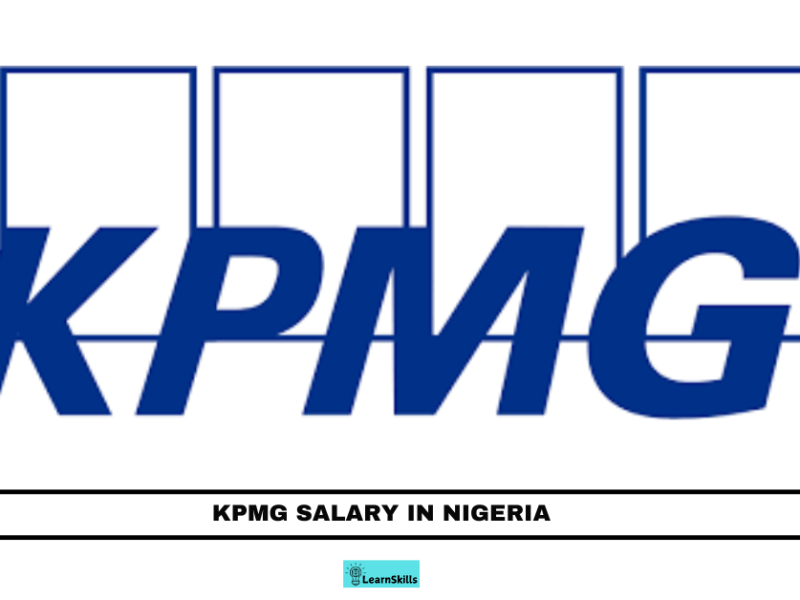KPMG is one of the leading professional services firms in Nigeria. The company offers a range of consulting, auditing, and tax services. If you’re considering a career with KPMG in Nigeria, you should know what to expect regarding salary.
As you explore various positions at KPMG, you’ll find that salaries vary widely. The monthly pay for a KPMG manager is ₦750,000, while senior associates earn between ₦5,000,000 and ₦9,000,000 annually.
Entry-level positions, such as internships, generally offer lower compensation, ranging from ₦480,000 to ₦840,000 annually.
Beyond salary, KPMG provides valuable learning opportunities and a chance to network with talented professionals.
Overview of KPMG in Nigeria
KPMG is a leading professional services firm in Nigeria, known for its commitment to quality and innovation. Through its various services, the firm plays a significant role in shaping the business landscape.
History and Establishment
KPMG Nigeria was established in 1978. It is part of the global KPMG network, which is present in 146 countries. The firm started focusing on audit services and gradually expanded its offerings.
Over the years, it has built a solid reputation for delivering high-quality tax, consulting, and advisory services.
KPMG Nigeria has played a crucial role in helping local businesses navigate challenges and adapt to changing market conditions. Its leadership has emphasized team development and sustainability in service delivery.
Areas of Expertise
KPMG Nigeria offers a wide range of services. Its key areas include:
- Audit and Assurance
- Tax Services
- Advisory Services
- Consulting Services
These divisions help clients manage risks, improve performance, and enhance governance. KPMG’s consultants work closely with businesses to create tailored strategies for local market needs. The firm’s expertise supports various industries, including financial services, healthcare, and technology.
Impact on the Nigerian Economy
KPMG Nigeria significantly impacts the economy through its services. The firm contributes to job creation and skills development by hiring local talent. Its training initiatives equip employees with valuable skills needed in today’s job market.
KPMG collaborates with government and industry bodies to promote sustainability and good governance. KPMG helps stimulate economic growth and innovation, fostering a more competitive environment by advising businesses and public sector organizations.
Through its ongoing projects and community engagement, KPMG influences the economic landscape positively.
KPMG Professional Services
KPMG offers several professional services in Nigeria, including advisory, audit, and tax services. Each area focuses on helping businesses maintain compliance while ensuring sustainable growth.
Advisory Services
KPMG’s advisory services help organizations improve performance and manage risks. This includes strategic planning, risk management, and process improvement.
Their expertise in navigating complex regulatory environments and achieving compliance benefits you.
They also focus on sustainability practices, helping organizations address environmental, social, and governance (ESG) issues. With their guidance, you can innovate while enhancing operational efficiency.
Key areas include:
- Change Management
- IT Advisory
- Business Transformation
Their team uses data analysis to develop actionable insights tailored to your business needs, ensuring strategic decisions for tangible results.
Audit and Assurance
KPMG’s audit and assurance services are vital for maintaining transparency in your financial reporting. They conduct thorough evaluations of your financial statements to enhance credibility with stakeholders.
Their approach includes:
- Financial audits
- Internal controls testing
- Compliance audits
This ensures that you meet industry standards and regulatory requirements. KPMG also emphasizes risk assessment, identifying potential issues before they become significant problems.
Tax Services
Understanding tax regulations can be complex. KPMG offers tax services that simplify this process for you.
Their team provides support in areas such as:
- Corporate Tax
- Transfer Pricing
- Indirect Tax Compliance
You receive assistance for tax strategy optimization and compliance with local regulations. KPMG’s expertise helps minimize tax liabilities while maximizing your business opportunities.
Their services also encompass advising on international taxation, ensuring your global operations align with local laws.
Career and Compensation
KPMG offers a structured approach to salary and career growth. Depending on their performance and leadership skills, employees enjoy competitive salaries, benefits, and opportunities for advancement.
Salary Structure
The salary at KPMG in Nigeria varies widely by position. For instance, here are some roles and their annual average salary ranges:
- Senior Associate: NGN5,000,000 – NGN9,000,000
- Intern: NGN480,000 – NGN840,000
- Analyst: NGN1,000,000 – NGN4,000,000
These figures show that KPMG provides a decent salary structure. The pay can reflect your experience, skills, and role performance. Managers earn NGN750,000 monthly, depending on their responsibilities and experience.
Benefits and Rewards
KPMG offers several benefits to enhance employee satisfaction. Important rewards include:
- Performance Bonuses: Based on your individual and team performance.
- Health Insurance: Medical coverage to ensure your well-being.
- Retirement Benefits: Contributions to help you save for the future.
Working at KPMG, you can also expect a supportive environment. While some employees mention long hours and weekend work, the knowledge and experience gained can be invaluable for your career.
Career Progression
Career growth at KPMG is closely tied to leadership qualities and performance levels. As you rise through the ranks, you might move from Analyst to Senior Associate and potentially to Manager.
- Entry-Level Roles: School graduates usually start here.
- Mid-Level Positions: After gaining experience, you can advance to Senior Associate or Manager.
- Leadership Roles: Top performers may transition into higher management or specialized roles.
KPMG promotes continuous learning. You are encouraged to take on challenges and show courage in your work. This focus on performance ensures that your efforts are recognized, paving the way for your advancement.
Industry-Specific Services
KPMG offers tailored services across various industries in Nigeria. Each sector faces unique challenges, requiring specialized knowledge and strategies. Here are key areas of focus.
Financial Services Consulting
In the financial services sector, KPMG provides valuable insights. Their expertise helps clients navigate risks and regulations.
Areas of concern include:
Risk Management: KPMG works with banks and insurance companies to enhance risk by identifying and mitigating risk management.
Transfer Pricing: They assist firms in establishing fair pricing for transactions between subsidiaries. This helps with compliance with local tax laws and international standards.
Analytics: KPMG uses advanced analytics to improve decision-making. This data-driven approach helps clients stay competitive and optimize their operations.
Industrial Markets Services
KPMG also covers the industrial market sector. This includes manufacturing, construction, and energy. Key services offered are:
Operational Efficiency: You receive support in streamlining processes to reduce costs and improve productivity.
Regulatory Compliance: KPMG aids companies in navigating complex regulations. This ensures compliance with local and international laws.
Market Insights: With actionable insights, clients can make informed decisions about investments and resource allocation.
Consumer Market Insights
In the consumer markets, KPMG focuses on understanding customer behavior. They help brands connect better with their target audience.
Key services include:
Market Research: KPMG conducts thorough research to understand trends and consumer preferences. This helps you tailor products to meet market demands.
Digital Transformation: They assist businesses in adapting to digital trends, including leveraging online platforms for improved customer engagement.
Brand Strategy: KPMG supports clients in developing strong brand identities. This is crucial for standing out in a competitive marketplace.
Regulatory Compliance and Risk Management
Effective regulatory compliance and risk management are crucial in the financial services industry. Organizations must adopt robust strategies to navigate regulations and mitigate potential risks.
Governance Strategies
Governance strategies define how an organization aligns its objectives with regulatory requirements. You should establish a framework that ensures accountability, transparency, and ethical behavior. This involves creating clear roles for board members and management.
Key components of governance include:
- Policies and Procedures: Develop written policies to govern operations and ensure compliance.
- Training Programs: Regularly train your team on compliance issues and company policies.
- Monitoring Systems: Implement systems to track compliance and risk exposure, allowing timely adjustments.
Consistent governance enhances organizational integrity and builds trust with stakeholders.
Internal Audit
Internal audits play a significant role in regulatory compliance by utilizing them to assess and improve the effectiveness of risk management and control processes. Regular audits help identify gaps in compliance and suggest areas for improvement.
Essential elements of an internal audit include:
- Risk Assessments: Conduct assessments to pinpoint high-risk areas requiring attention.
- Reporting: Create detailed reports on findings and management recommendations.
- Follow-Up: Ensure that management acts on audit recommendations to close gaps in compliance.
This process shields your organization from potential losses and strengthens governance.
Financial Risk Management
Financial risk management protects your organization from market fluctuations and operational risks. You should implement strategies to identify, assess, and mitigate financial risks.
Key practices include:
- Risk Identification: Recognize various risks, such as credit, market, and operational risks.
- Stress Testing: Use stress tests to evaluate how your organization could withstand financial crises.
- Continuous Monitoring: Regularly review risk exposure and adjust strategies as needed.
You can safeguard your assets and ensure business longevity by prioritizing financial risk management.










